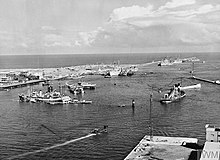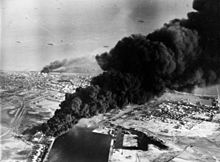

Operation Musketeer
The closure of the Suez Canal from November 1956 to April 1957 was caused by the Second Arab–Israeli war also known as the Suez Crisis in 1956. On 26 July 1956 Egyptian president Gamal Abdel Nasser nationalized the Suez Canal from British and French investors who owned the Suez Canal Company, causing Britain and France to devise a military operation with the help of Israel to invade the Egyptian Sinai Peninsula and have British and French paratroopers drop in to protect the Suez Canal, but the objective was to take the canal back. The United States and Soviet Union condemned the invasion and de-escalated the situation by early 1957.
Oil supply through the canal
Around 66% of oil that Europe consumed at the time came through the Suez Canal from mostly Arab States.
Aswan Dam project
The United States was initially going to help fund the Aswan Dam but reneged on their earlier commitment because Egypt was cozying up to Communist influences in the Soviet Union, Czechoslovakia, and recognizing the Chinese Communist Party as the government of China. Gamal Abdel Nasser nationalized the Suez Canal to get the transit fees from that to help fund the Aswan Dam project.
Egypt blockade of Straits of Tiran

In the aftermath of the Suez Crisis, growing tensions between Egypt and Israel resulted in the blockade of the Straits of Tiran. Preventing passage through this international waterway and blocking safe passage of civilian ships to the Port of Eilat, Israel's southern port.
The Israel government followed through with stated warnings that it considered the blockade of the Straits of Tiran a casus belli, launching attacks on Egyptian forces in the Sinai. In the ensuing Six-Day War, Israel gained control of Sinai Peninsula. Egypt launched the 1973 Yom Kippur war, which resulted in the Suez Canal being retaken by Egypt in the Kilo 101 talks, which eventually lead to the 1979 peace talks.
In 1982, the Sinai was returned to Egypt and diplomatic relations normalized through the successful Egypt–Israel peace treaty.
See also
- Closure of the Suez Canal (1967–1975)
- 2021 Suez Canal obstruction
- Arab–Israeli conflict
- Israeli passage through the Suez Canal and Straits of Tiran
- Six-Day War
References
- "Historical Diplomacy Simulation: Suez Canal Crisis – National Museum of American Diplomacy". 25 May 2021.
- "How the (Closure of the) Suez Canal changed the world". 31 August 2014.
- "Suez Crisis".
- "Suez Crisis, 1956". 13 December 2007.
| Wars and conflicts involving Israel | |
|---|---|
|
| Cold War | |||||||
|---|---|---|---|---|---|---|---|
| 1940s |
| ||||||
| 1950s |
| ||||||
| 1960s |
| ||||||
| 1970s |
| ||||||
| 1980s |
| ||||||
| 1990s | |||||||
| Frozen conflicts | |||||||
| Foreign policy | |||||||
| Ideologies |
| ||||||
| Organizations | |||||||
| Propaganda |
| ||||||
| Technological competition | |||||||
| Historians |
| ||||||
| Espionage and intelligence |
| ||||||
| See also | |||||||